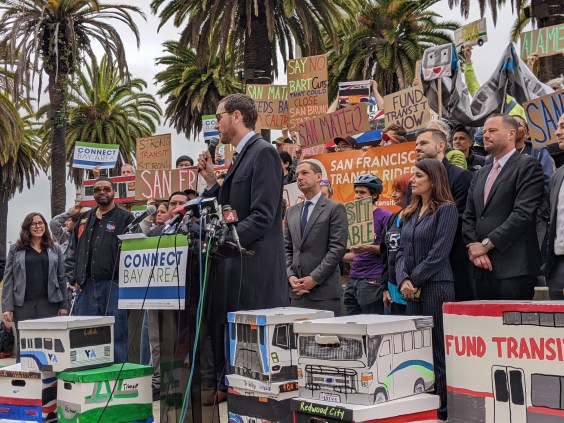A growing coalition of California elected officials and local governments are demanding that fossil fuel companies pay for the climate damage they’ve caused, as momentum builds statewide for the proposed Polluters Pay Climate Superfund Act.
The legislation—introduced earlier this year by Senator Caroline Menjivar (D-San Fernando), Senate Bill 684 and Assemblymember Dawn Addis (D-Monterey), Assembly Bill 1243—would force the largest oil and gas corporations to help cover the massive costs of fires, floods, and other climate-related disasters devastating California communities. The legislation will be reintroduced this January.
The Elected Officials to Protect America (EOPA) Code Blue campaign announced this week that 135 elected officials and 11 city councils from across the state have formally endorsed the bill. Cities backing resolutions in support of the act include Albany, Berkeley, Laguna Beach, Los Angeles, La Mesa, Oxnard, Port Hueneme, Santa Cruz County, San Diego, San Francisco, and San Jose.
“All over the state, extreme weather events caused by the climate crisis have happened, and are increasingly getting worse,” said Dominic Frongillo, executive director and co-founder of EOPA. “There is an enormous body of evidence of the devastation caused by rising emissions, including trillions of dollars in economic costs. For too long, fossil fuel corporations have reaped enormous profits while lying about the catastrophic risks of their products.”
Local Governments Lead the Charge
Between 1980 and 2024, California has experienced 46 billion-dollar disasters, with losses that continue to escalate. With the Trump Administration in full retreat on helping communities in states that didn’t vote for him, many California communities have found themselves without support. The legislation would increase the support that these communities can get from the state.
“The Polluters Pay Climate Superfund Act is a practical step to make sure the largest fossil fuel companies cover the cost of the damage they knew their products would cause,” said Los Angeles City Councilmember Katy Yaroslavsky, a member of EOPA’s California Leadership Council. “It brings resources back to the communities carrying the burden and helps fund the work of rebuilding and preparing for what’s ahead. The Los Angeles Council fully supports the bill with our resolution. I’m grateful to everyone leading the charge to get it passed.”
Mounting Costs of Inaction
The need for funding has only grown more urgent as climate disasters intensify. In January 2025, wildfires tore through Los Angeles and Ventura Counties, destroying over 18,000 structures in the Palisades and Eaton fires and claiming 30 lives. The estimated cost of the disaster exceeds $250 billion.
Under the legislation, CalEPA would be tasked with completing a comprehensive climate cost study quantifying total damages to California through 2045 caused by fossil fuel emissions between 1990 and 2024. Based on that study, CalEPA would identify responsible companies and assess fees proportional to their emissions.
Funds collected would be used to mitigate rate increases, support disaster recovery, and invest in clean energy infrastructure, with at least 40 percent directed to disadvantaged communities.
A Matter of Environmental Justice
For leaders in communities most affected by pollution, the bill is also about fairness.
“Science tells us that the extreme weather we are experiencing is because we are destroying our climate by using fossil fuels as a form of energy,” said Daniel Ramos, Mayor Pro Tem of Adelanto and a Navy veteran. “With an administration in D.C. that promotes fossil fuels as energy security, we must take matters into our own hands. Only clean energy is energy security.”
Ramos warned that without swift action, the state’s vital resources could collapse. “California’s water supplies are on life support. Without more climate crisis mitigation programs, our state’s ability to deliver water will be cut by up to 23 percent in 20 years,” he said. “We must start making Big Oil realize they will have to pay for what they are doing, otherwise they will continue to destroy the planet. We need the Climate Superfund Act.”
Other officials echoed that sense of urgency.
“For decades, Big Oil has profited from their climate crisis carbon pollution, all the while knowing the dangers that their products inflict on innocent people and their communities,” said Ahmad Zahra, Fullerton City Councilmember and EOPA California Leadership Council member.
Public Support Builds
Public sentiment appears to be shifting in favor of holding fossil fuel companies accountable. Last April, more than 100,000 Californians signed a petition urging state lawmakers to pass the Superfund Act, however the legislation failed to make it out of committee.
A recent study published in Environmental Research found that 34,000 Californians died prematurely in 2018 due to air pollution caused by fossil fuel emissions—a figure environmental advocates say underscores the moral imperative behind the legislation.
“Many in my community are forced to breathe in air saturated with fossil fuel particulate pollution because they work on farms,” said Felipe Perez, Firebaugh City Councilmember and former mayor. “Many become sick and too many have died. The California legislature is our only line of defense. The Polluters Pay Climate Superfund Act addresses the financial injustices imposed on taxpayers and working families from climate-related disasters by requiring fossil fuel polluters to offset the costs we’ve been paying.”
Following the Lead of Other States
If enacted, California would join New York and Vermont, which both passed similar “polluters pay” climate superfund laws in the last two years. The push comes as federal funding for environmental programs remains uncertain, following executive orders that curtailed many climate initiatives during the Trump administration.
“California is the world’s fourth-largest economy,” Ramos said. “If we take the lead on making Big Oil pay, the rest of the country will follow.”
As the bill heads into committee hearings later this year, supporters say the stakes couldn’t be higher. With each new disaster, the cost of climate inaction grows—and so does the determination of local leaders to make polluters pay.






